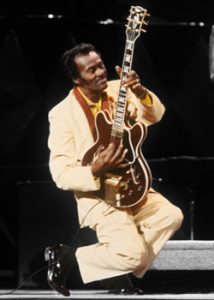
Ever since its commencement in the 1950s, Rock and Roll music has been a staple of American life. As society has progressed, this innovative style of music has grown parallel to the American people. However, modern Rock and Roll has fallen into a comatose state, failing to meet the rebellious and memorable precedent set by Rock and Roll’s iconic founding fathers.
Racially diverse icons including Elvis Presley and Chuck Berry did their part in uniting a divided nation during the 1950s, a decade remembered for racial prejudice and extreme conformity stemming mainly from the Second Red Scare. The 1960s saw Beatlemania take over the world, as this British foursome became a household commodity. The immense popularity of The Beatles reflected the societal shift towards drugs and free sex following the extremely conservative 1950s. One of Rock and Roll’s most significant shifts took place in the 1970s, as a number of sub-genres including disco, glam, and metal arose throughout the nation. The rise of these sub-genres is attributed mainly to the ideological divides of this turbulent decade caused by the abortion debate amongst others. The 1980s conversely, is remembered mainly for its power ballads and hair bands that stemmed from widespread materialism, though containing the early remnants of grunge music, which would rule the early 1990s behind the intense emotion of Nirvana and Pearl Jam, who spoke as a unified voice for a disgruntled generation of American teenagers.
With Rock and Roll having such a considerable impact on the past five decades, Americans who have grown up in the 2000s wonder, “How has Rock and Roll affected us?” The answer to this question is far from clear. In fact, many believe that the evolution of Rock music has been diluted so much that this beloved genre has become truly unrecognizable, losing the rebellious nature that brought about its long lived reign of success.
The Billboard Charts show striking evidence that favor this theory. In 2010, no Rock bands were featured in the year end top 10 chart. While this does prove that Rock sales and radio play have taken a severe dip, one could easily argue that this decline is nothing more than a product of American society recently leaning towards the music of Lady Gaga and her fellow Pop sensations. However, Billboard’s End of the Decade Chart proves that this overwhelming shift of prominence to Pop and Hip-Hop has been taking place for over 10 years. One of Rock’s recent successes, Arcade Fire, the Grammy Award-winning Indie Rock sensations, have come under fire from long time fans and critics for betraying their “Indie” status by using social networking promotions to help gain the top spot on the weekly Billboard Charts. A problem similar to what Nirvana faced in 1992 with the success of “Nevermind”, Arcade Fire is being labeled by many as sellouts. Unlike Nirvana, Arcade Fire, although successful, does not possess the rebellion from which Rock was born, as most of their new album revolves around the bores of suburban life. Whether justified or not, it is arguable that such pressure to remain authentic has led to this drop of Rock and Roll sales.
The only Rock band featured on the End of the Decade Chart is Nickelback, a hit making machine that many Rock critics consider to be a predominantly Pop band due to repetitive riffs and simplistic lyrics. The lack of successful, authentic Rock bands can be easily attributed to the influence of record companies, an unrelenting power that has had a significant impact on musical trends for as long as music has been profitable. To the trained and untrained eye alike, it appears that bands no longer aspire to put together a classic album, but to produce a mainstream single. The influence of record labels, which was seen habitually in the grunge driven 90s, is also a major scapegoat for modern Rock’s lack of rebellious uprising. Whatever the reason, Rock and Roll lacks a band stable enough to anchor its legitimacy in the modern music industry.
Of course, this article could not be complete without placing some blame on the cyber musical revolution. Obviously, a dip in sales has been felt in most genres due to the ever-increasing popularity of free file sharing programs and the rise of the self-released mix tape. Nowadays, a small market band from anywhere in the country can gain followers rapidly through the distribution of free mix tapes and Internet exposure. While this brings short term success, in the long run, this immediate exposure will harm the Rock and Roll industry by over-saturating consumers with an abundance of mediocre music.
The main contender for the 2000s marquee Rock band is thought to be Coldplay, who Rolling Stone Magazine has anointed “the greatest rock band in the world.” While no one is attempting to compare Coldplay or Arcade Fire to The Beatles, the success of these modern Rock bands is hard to ignore and deserves recognition.
However, many find it difficult to identify our generation’s iconic Rock and Roll figures. Is Coldplay’s Chris Martin to stand alongside the likes of Mick Jagger, Freddy Mercury, and Kurt Cobain? To the average listener, this idea is beyond the realm of realistic possibility. Perhaps, even more important than an excellent front man is a headlining guitarist, a small conglomerate that is rapidly dying out. The 1960s were ruled by the psychedelic anthems of the legendary Jimi Hendrix, touted by many as the greatest guitarist of all time. Unfortunately for Rock and Roll enthusiasts, guitarists in the modern era of Rock do not measure up to the icons they have been in the past, mainly due to a massive switch to electrically synthesized beats. This switch has effectively eliminated the significance of the guitar solo and the headlining guitarist. Seemingly “God-like” front men and guitarists have become a relic of a distant past as Rock and Roll has stumbled through the first decade of the 21st century.
With rebellion fueling Rock and Roll’s eternal flame, many wonder how Rock’s bellicose nature has been lost in a generation of economic despair and war. This generation has as much motivation to start a musical uproar as any other, so why has this yet to occur? The Vietnam War, which occupied 20 years of military conflict, inspired some of American’s greatest music, while single handedly creating the idea of “making love, not war.” The War in Iraq has sparked international controversy that seemingly, should be transferred into brilliant Rock and Roll. The lack of rebellious anthems stemming from the war is worrisome to true Rock and Roll fans who feel as though nothing can rekindle rebellion more effectively than controversy.
This loss of rebellion leads many to believe that Rock and Roll has strayed too far from its traditional principles. But, does Rock music really carry tradition at all? Is the tradition of Rock truly not its lack of tradition and guidelines? Rock and Roll is indeed less of a genre than it is a lifestyle, progressing to fit the modern element of “cool.” For decades, Rock and Roll has been the epitome of “cool”, but recently, Hip Hop has taken over this cultural label.
While many believe Rock’s rebellion has been lost, Spin Magazine’s 2010 Artists of the Year, The Black Keys are hoped by many to be the saviors of Rock and Roll. Unfortunately, The Black Keys have a ways to go before reestablishing Rock and Roll’s legitimacy in the music industry. Presently, Rock’s most rebellious act appears to be Neil Young, who is seen by many as a remnant of a distance era of defiance, with a swiftly approaching expiration date.
Perhaps, Rock and Roll has lost its luster and will never return to dominating the American airwaves. Whether this be true or not, one must feel that this decline in Rock music is partially reactionary to a societal difference in the modern world. Hip-Hop has reached the suburbs and is not going anywhere in the foreseeable future, while Pop music will always rule the club scene, so where is Rock music to be played? The days of jukeboxes blaring out contemporary Rock and Roll appear to be gone and this truth is as sad as any.
For many Americans, this represents the end of an illustrious era of musical supremacy and the death of Rock and Roll’s influential sub-culture amongst the youth. For others, the hope of an undiscovered talent that will effectively represent the spirit of our fighting generation still rages on. The fate of this struggling genre remains to be seen, but for listeners’ sake, one must hope that the latter will occur, saving Rock and Roll from fading into obscurity.










Cindy Dow • Apr 22, 2011 at 3:38 pm
Refreshing and soulful. I err on the side of hope….hope for the undiscovered rock talent which I am certain is out there somewhere….
James Elwood • Apr 21, 2011 at 9:16 pm
Great work. Unfortunately mainstream music has been on an awful streak, across the board, all genres included. That’s turned me into one of “those guys” that only listens to music that’s, for the most part, underground. However, as long as you aren’t annoying about it, think that Radiohead’s some new indie band and avoid the urge to stop liking bands when they go mainstream, it can take you a long way.
Anyway, I’d be remiss if I didn’t flood this page with music recommendations.
Th’ Legendary Shack Shakers
Scott H. Biram
Gogol Bordello
Hank Williams III
Left Lane Cruiser
James Hunnicutt
.357 String Band
Jayke Orvis
Joe Huber
Mighty Tiny
Wayne Hancock
Koffin Kats
kim keeman • Apr 13, 2011 at 10:55 am
this is hands down the greatest piece of jouralizing iv ever seen…i love this so much, ur my idol
Kim Keeman • Apr 13, 2011 at 10:51 am
i loved this article. hands down, the greatest piece of journalizing iv ever seen…you rock